

riting is a passion, but until it starts paying the bills, many writers find themselves in the 9 to 5 work world, butting their heads against the glass ceiling and being left on the wrong side of the wage gap. The good news isóKelly Love Johnson is the perfect guide to help advance your career and show you how you can earn what you are worth!
Kelly Love Johnson is a writer and managing editor for Skirt! magazine. She got her first job at age 15, worked full-time through two college degrees, and earned her management skills badge by swimming with sharks and being thrown to the wolves. She hasnít worn pantyhose or fetched coffee in 10 years.
Kelly has been writing for publication for more than 10 years (for Skirt! since 1999) and her work has appeared in a variety of national and regional publications, including Flair Magazine, Mademoiselle, Digs Magazine, Parents, and numerous literary journals. She won the South Carolina Fiction Project for her short fiction in 1999 and a Family Y Fiction Fellowship in 2000. She occasionally leads writing workshops in Charleston and has been a guest lecturer or panelist at several regional writersí conferences.
***
WOW: Kelly, welcome to WOW! Weíre excited to have you with us, so Iíll just jump right in. You mention having gotten your first job at fifteen. I was sixteen and worked at the prize counter in Chuck E. Cheese, cashing out Skee-Ball tickets for children wearing pizza sauce smiles. What was the job that launched your first step into the workforce?
KELLY: I canít say that it was my first job, though having a job at fifteen certainly impacted my plans for my future (because I learned pretty early that I didnít want to be a hostess at Carey Hilliards, a waitress at Po Folks, or a drive-thru cashier at Arbyís for the rest of my life).
The job that really put me on the first few rungs of the corporate ladder was a bit of a flukeóI took a job as file clerk at a software company during my first year of college, thinking that filing all day would free my brain for more important pursuits, like studying and writing (which Iíve been hooked on since fourth grade). Apparently, I was an awesome file clerk, because I ended up supervising a customer service staff within a year and managing a call center before I was 25. And I was taking a full course load, summers included, in college.
WOW: Already a manager by 25óthatís amazing! Clearly, youíve done well paddling your way through the treacherous waters of Corporate America. How did you go from that arena to deciding to become a writer?
KELLY: Everything Iíve ever done has always been secondary to my writing aspirations, so the writing came first. I just didnít know that I could make a living from it until 1998 or 1999!
I love the personal narrative genre (both reading it and writing it), but Iíll admit to a phase in high school during which I thought I would become a famous poet. I have notebooks that date back to 8th and 9th grade, but the cringe factor on that teen angst poetry is so high Iím not sure Iíll ever be able to read them.
Corporate America was my support, my stopgap, my way to make money until I could do what I truly love. I think ďworking for the manĒ can be difficult for creative types, but I wouldnít trade my experience for anything. My current job is a strange hybrid of creative and corporateóI have one foot on either side.
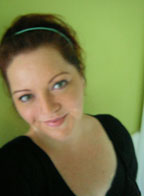
"Everything Iíve ever done has
always been secondary
to my writing..."
WOW: I never spent more than about a year total in my various attempts to work in Corporate America (think square peg, round hole). In your book, skirt! Rules for the Workplace: An Irreverent Guide to Advancing Your Career, you talk about breaking through the glass ceiling. Is there really such a thing in the 21st Century workplace?
KELLY: Absolutely, and the data backs it up. Though women make up almost half of America's labor force (U.S. Department of Labor), only seven Fortune 500 companies have women CEOs or presidents, and 90 of those 500 companies don't have ANY female corporate officers (Catalyst.org). This isnít a flukeóand it isnít because women are staying home with their children. The number of single women who work full time while raising children gets higher every year, and unfortunately, a large percentage of those women are surviving at or below poverty level.
WOW: I think itís great that in your book you include personal anecdotes about your workplace experiences to illustrate a specific point you wanted to make. If you can pick a favorite example, Iíd love to have you share the story with our readers.
KELLY: One of the statements I make when I teach workshops about getting ahead at work is "hire people who are after your job." It tends to get a mixed reaction, but my point is that you canít get ahead until thereís someone ready to step into your place. Iím always baffled when bosses see employees with high aspirations as a threat.
The example I use in the book is about an intern I hired when I was an editor for a local newspaper. She was definitely a high achieveróshowed up on time, was enthusiastic, and made it clear she wanted to learn everything about the business of journalism. There were other interns during the semesters she worked, but none matched her level of professionalism or abilityóand she knew it. Halfway into her first semester with us, she informed me that she wanted my job (or one like it).
The following semester, rather than asking her back as an intern, I hired her as a part-time employee. While still taking a full course load, she threw herself into the job. Her favorite phrase was (from the movie "Working Girl"), "Iím right on top of that, Kel." Before sheíd even graduated from college, she was in charge of our internship program (hiring to firing) and filling in for me when I was out of the office.
One of the other editors and I came up with a nickname for our high-performing former-intern-turned-editorial-assistant: "Hostile Takeover." The "hostile" part was a joke, but the takeover part wasnít. I was promoted to managing editor only because she was there, upon college graduation, to step into my shoes full-time as assistant editor.
If we feel threatened or encroached upon by the ambitious others who work for us, we only hurt our own careers. Iíve seen mediocre managers who hire underperformers simply because they think it makes them look that much better. Wrong! Hiring high achievers not only makes us appear smarter, chances are they can teach us a thing or two. Not to mention that when weíre ready to move up another rung, we have a ready-made replacement.
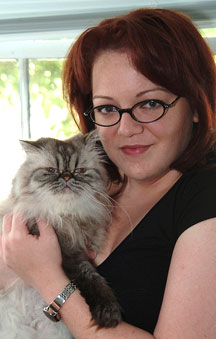
"Thereís enough out there for all of us to get a piece of the pie."(Photo: Kelly & Nina)
WOW: On your book blog, you posted a quote: "When women think of power as dominance, they really hate it. When they think about power as the ability to do things, they love it. Because women love getting stuff done." ~ Margaret Heffernan, author of How She Does It: How Women Entrepreneurs are Changing the Rules of Business Success (More magazine, September 2007).
How do you think women can reprogram themselves to think differently about their own power?
KELLY: I think we have to stop thinking that we have to act like men to get ahead at work. Iíve seen a lot of good female managers set themselves up for failure because they were so fixated on power that they lost sight of their own abilities. I donít care what my title is or what parking space I get or who Iím the boss of. I care about how much money I make and how I can improve my job performance.
The rest of it is all ego and we really should rise above it. Iíve seen a lot of backstabbing and ďmine is bigger than yoursĒ in the workplace, from women AND men, and thereís no doubt that it holds us back. Thereís enough out there for all of us to get a piece of the pie.
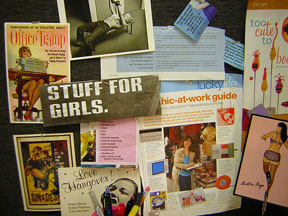
"...we have to stop thinking that we have to act like men to get ahead at work."
(Kellyís mood board at the office)
WOW: Iím very familiar with alpha and beta personality typesóa subject you talk about in your book. (Iím definitely an alpha.) But can you explain to our readers how those two types face different challenges in the workplace?
KELLY: Because I am an alpha, I have a tendency to take charge when a crisis presents itself. I live my life in problem-solution mode: Problem? Solution. End of discussion. Sometimes I have to remind the betas around me that I do want to hear their ideas, and I am most often incredibly grateful when someone else speaks up, because it takes the pressure off.
If youíre a beta, stalling tactics work well to give you some time to get your thoughts in order and, if necessary, give yourself a little pep talk before jumping in feet first. My own beta mantra is, "Iím good at my job...Iím good at my job." I am good at my job; sometimes I just have to remind myself on days when my confidence wanes. Stalling tactics: "Let me just run back to my desk and get my notes on that," "I have to make a quick call; can we meet in the conference room in ten minutes?" and (my personal favorite, learned from my psychotherapist mother) "So what I hear you saying is that we have a serious problem with XYZ. Can you give me some background?" (and use that background summary time to gather your own thoughts).
Every beta has a tiny alpha insideóand vice versa. Let the little one out every now and then; you might be surprised at the results when your inner-alpha throws a little muscle around, or your inner-beta turns a volatile meeting into a problem-solving roundtable.
Thereís a lot more to itóthe book has checklists on how to know if youíre an alpha or beta, how to modify behavior, how to use your traits for good and not evil, etc.
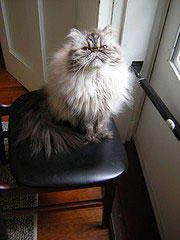 ...the dictionary defines assertive as "persistently positive or confident."
...the dictionary defines assertive as "persistently positive or confident."
(Ninaís having none of it!)
WOW: In the corporate workplace, it seems that the women who have strong opinions and choose to voice them are called witches (with a slight consonant change). How can a woman assert herself and not be considered a threat? Or is that possibility just wishful thinking?
KELLY: In the workplace, weíre expected to be self-confident. And particularly in sales positions, weíre trained to be assertive. Good salespeople are described as "bulldogs"óthey latch on and wonít let go. Men are applauded for this behavior, while many women are treated like yappy Chihuahuas for the same characteristics.
Typically the word aggressive is used to describe behavior thatís pushy, abrasive, or forceful. In contrast, the dictionary defines assertive as "persistently positive or confident." The real difference between being assertive and being aggressive is how our words and behavior affect other people. Assertive communication supports our own rights while still taking the feelings of others into consideration. In short, assertive behavior shows respect and aggressive behavior does not.
One of the most insidious reactions women have had as a result of negative stereotypes is to pull back, often running in the other direction. Iíve encountered too many soft-spoken, demure women who wonder why theyíre not making sales or getting promoted. I can tell from their body language and use of the passive voice that theyíre probably being passed over because theyíve become as charismatic as dishrags.
Even though I know the answer, I always ask them when was the last time they asked for a raise or promotion (or sale or new account). The response is usually some form of "why bother?" They feel trapped in a catch-22, damned if they do and damned if they donít. "I was told to tone it down," one friend told me. "So I did."
There isnít just one thing women like us can do (I have a lengthy list in Chapter Five), but I donít think being considered a threat (or a bitch) is necessarily a bad thing.
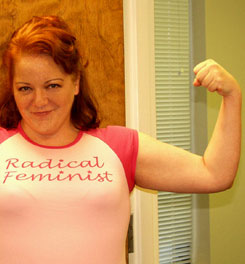
"Being a good feminist has nothing to do with hating men. Itís about equality."
WOW: The concept of feminism has changed so much over the many decadesófrom the first blossom, seeking womenís suffrage, through the years of militant feminism that was very anti-man. Do you have an opinion about the current trend and its direction?
KELLY: Many women are hesitant to identify themselves as a feminist because of the negative connotations and stereotypes the word carriesólike man hater or (my least favorite) ďfeminazi.Ē Itís easy for people who would welcome a return to the 1950s (women in the kitchen, not the boardroom) to dismiss our ideals and values as feminist propaganda. But itís important to be clear about one thing: Being a good feminist has nothing to do with hating men. Itís about equality. We donít want more; we just want the same.
WOW: You have a chapter in your book called ďWork Like a Girl.Ē What does that mean?
KELLY: We are girls, we are females, we are womenóbut we shouldnít let anyone take those things and turn them into reasons why we deserve less and why we should be considered weaker, lacking in intelligence, and run by our emotions.
Women have many characteristics that make us natural leaders. For instance, the very same nurturing instincts that can lead us astray on a career path by allowing us to become sidetracked looking for external validation are also the instincts that make us compassionate managers.
A good manager understands that, while the bottom line comes first, they are still managing a function that involves human beings. Women are less likely to put that fact aside, and we are able to focus both on the bottom line and on individual members of our staff. Rather than encouraging women to act like men in the workplace, the "Work Like a Girl" chapter highlights how we can draw on our natural female traits that will help us improve job performance.
"Women have many characteristics that make us natural leaders."
WOW: Do you have any tips to share to help women direct the future of their careers?
KELLY: Tons! I wish I could narrow it down to one or two. In general, I think focusing more on the bottom line and your paycheck/compensation and less on the emotional and social aspects of work life is something Iíve seen over and over again with successful women.
I learned from one of them a long time ago (OK, it was my mother) that making friends in the office is less important than making money. Itís great to have a social work environment, but the size of your paycheck matters most. I think if more women were comfortable asking for money, talking about money, asking what they can do to make more money, weíd be able to close the wage gap.
WOW: Your book is filled with so many practical and encouraging tidbits to inspire women to have the career success they deserve. Iíd love to have you share your thoughts on this with our readers.
KELLY: Thank you! Iíll consider it successful even if it only gives one woman the courage to ask for a raise. Closing the wage gap is something Iím very passionate about. It makes no sense in this day and age to have any disparity in salary based on gender. I think our society has progressed enough so that gender should not be a factor in the workplace.
WOW: I admit, Iím not exactly the office politics poster girl. I never play well with others, I run with scissors, and if I get angry enough, I throw verbal sand. What kind of advice would you give someone like meósomeone who likes to march to her own drum, but needs to learn to get along?
KELLY: Iím not Ms. Perfect either! In fact, Iíve broken every single one of my own rules. Just three months ago, I had a mini breakdown and came this-close to bursting into tears in the office. I put my big sunglasses on, picked up my bag, and got out of the office as fast as I couldóthen sat in my car and cried for an hour.
Thereís a whole chapter in the book on "damage control" that covers how to make a comeback when you screw up. In the instance I mentioned, my boss knew I left in tears because I ran into a co-worker on my way out and couldnít stop to talk because I was holding it in. I made sure she understood that I needed some space, that it wasnít something I do all the time (she knew that), and that Iíd come back to the office the next morning with a happy face on.
Temperance and honesty are our best friends. If we learn how to recognize what triggers tantrums, crying jags, and outbursts, we can better manage them. Itís not the action; itís the reaction we should be worried about.
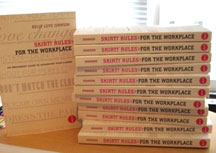
"Temperance and honesty are our best friends."
WOW: Thatís good advice! Iím like-this with honesty, but I donít think temperance and I have met yet. You certainly handled that situation well. Can you share with our women readers some web resources that will help them move ahead in the workplace?
KELLY: Itís incredibly important to do your research on what youíre worth and Salary.com is a great tool for that. I also love FastCompany.comóIíve been a fan since it came out in print in the 90s. I think itís a great mag to expand horizons, learn management skills, get ideas for being a leader at workóand it isnít dry. Itís probably skewed more toward tech business, but I learn something new every time I visit the site (or read the print mag).
WOW: If you had one single message you would want readers to take away with them after reading skirt! Rules for the Workplace: An Irreverent Guide to Advancing Your Career, what would it be?
KELLY: If youíre afraid to ask for a raise, get over it! Thereís a lot more to that, but if I had to sum it up in a sentence, that would be the one.
WOW: [laughs] Iím so inspiredóI think Iíll have to ask Angela for a raise! But seriously, I think WOW! has really found a unique niche and is filling an extremely important need for women writers. As an editor for skirt! Magazine, do you see a trend developing with women embracing their all-woman audience and excelling in online and print publishing?
KELLY: I think skirt! is a unique product and I donít have a lot of experience with other womenís magazine in the same way (other than as a freelance writer). I think it has less to do with the women-centric focus of the publication and more to do with not "dumbing down" our content like other magazines and newspapers do. We donít edit out the big words, we would never run a "how to please your man" article, we understand that women are more complicated than diet tips and recipes. Our readers are smart and we never underestimate them. I donít think I answered your trend question!
WOW: Donít worry. Your answer was better than my question! Now, Iím curious... Do you have another book in the works? If so, can you tell our readers a little bit about it?
KELLY: I do have another book in the works, but the concept isnít quite finalized yet. It developed from an essay I wrote earlier this year called "Hairy Legs & All" that ran in our July 2007 issue. I stopped shaving my legs (and under my arms) for nine months after I realized I didnít know WHY I was removing my body hair (turns out that Gillette marketed a razor for women in the 1920s and thatís how it became not only mainstream, but practically mandatory). I treated the process like an ďexperimentĒ in feminism and came to some pretty interesting conclusions in the end (and started shaving again).
The general idea is: Can I be a feminist and...shave my legs/wear lipstick/wish for a husband/change my last name when I get married/etc. I hope it will be a treatise for young women who have misplaced ideas about what feminists are supposed to be, as well as help negate the feminist-as-dirty-word paradigm that weíre all trying to combat.
WOW: That sounds like such a great premise for a book! I canít wait to read itóI already want to interview you about it! And I just have to say that I love your outside-the-box experiment. (But I canít go a single day without shaving or I get all heebie jeebie about it!) Ok, now, back on trackÖ In your book, you talk about embracing change. Are there any significant changes on the horizon for you with your book coming out in January 2008?
KELLY: I think Iím going to spend a bit of time traveling here and there for book signings and workshops, but Iím not quitting my day job or anything! I love skirt! too much.
WOW: That sounds like a great plan. And a lot of juggling! With 2008 just around the corner, do you have any resolutions for the New Year?
KELLY: I make over 100 every year and a lot of them are intensely personal, but ďmake more moneyĒ is at the top of the list. And of course, finish my second book. On the intensely personal side, I have some commitment issues with relationships that Iíd like to try and overcome. Iím learning how to compromise in my personal life and have twenty or thirty resolutions relating to that. Itís a hard road!
WOW: Kelly, I have no doubt that youíll successfully navigate any path you choose in your life. You have such a wonderful outlook and your passion for your topic is contagious! Thank you so much for such an inspirational interview! I know your tips and suggestions will be a great call-to-action for our readers!
Readers, check out Kellyís site at www.kellylovejohnson.com for tentative dates of her signings and workshops; more will be added as they are confirmed. You can reach her via email from her site as well. She has a myspace page www.myspace.com/rulesforwork and will send out bulletins to her friends list as readings/signings are added. You can also catch up with Kelly and "gaze into her navel" on her Microfamous blog.
***
Annette Fix is an Editor for WOW! Women On Writing, an author, and spoken-word storyteller based in Laguna Niguel, California. Annette's memoir, The Break-Up Diet will be available Valentine's Day 2008.